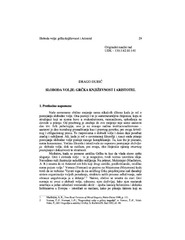Приказ основних података о документу
Sloboda volje - grčka književnost i Aristotel
Free will: Greek literature and Aristotle
| dc.creator | Đurić, Drago | |
| dc.date.accessioned | 2021-10-12T10:43:54Z | |
| dc.date.available | 2021-10-12T10:43:54Z | |
| dc.date.issued | 2007 | |
| dc.identifier.issn | 0353-3891 | |
| dc.identifier.uri | http://reff.f.bg.ac.rs/handle/123456789/657 | |
| dc.description.abstract | This article attempts to show the place of free will in the ancient Greek culture. That culture is represented here by Greek drama and Aristotle's ethics, in which the concept of free will is not fully articulated, but only indicated. According to Greek drama, though a man is responsible for the results of his actions, he is not acting freely because gods' decisions determine his will. According to Aristotle, a person's decisions and actions are determined by his character and his deliberation concerns the means, not the final ends. Nevertheless, Aristotle makes a 'room' for a free will, maintaining that 'we are ourselves in a sense partly responsible for our states of character'. . | en |
| dc.publisher | Univerzitet u Beogradu - Filozofski fakultet - Institut za filozofiju, Beograd | |
| dc.rights | openAccess | |
| dc.source | Belgrade Philosophical Annual | |
| dc.title | Sloboda volje - grčka književnost i Aristotel | sr |
| dc.title | Free will: Greek literature and Aristotle | en |
| dc.type | article | |
| dc.rights.license | ARR | |
| dc.citation.epage | 39 | |
| dc.citation.issue | 20 | |
| dc.citation.other | (20): 29-39 | |
| dc.citation.spage | 29 | |
| dc.identifier.fulltext | http://reff.f.bg.ac.rs/bitstream/id/2187/654.pdf | |
| dc.identifier.rcub | https://hdl.handle.net/21.15107/rcub_reff_657 | |
| dc.type.version | publishedVersion |

